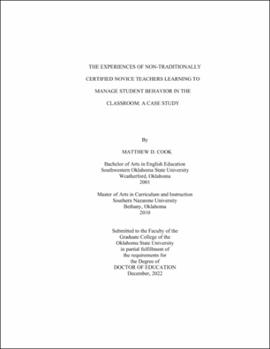| dc.contributor.advisor | Curry, Katherine | |
| dc.contributor.author | Cook, Matthew David | |
| dc.date.accessioned | 2023-07-05T20:56:55Z | |
| dc.date.available | 2023-07-05T20:56:55Z | |
| dc.date.issued | 2022-12 | |
| dc.identifier.uri | https://hdl.handle.net/11244/337891 | |
| dc.description.abstract | The purpose of this study was to gain an understanding of how novice, non-traditionally certified teachers learn classroom management skills and address challenging student behaviors. Alternative teacher preparation programs aim to prepare entry year teachers for the classroom as quickly as possible. While alternative certification programs aim to prepare entry year teachers for the classroom environment, some of these teachers feel prepared and some do not. One possible reason that some teachers are not prepared is the lack of attention given in alternative certification programs to training novice, non-traditionally certified teachers how to manage student behavior in the classroom. Participants in this study met certain criteria. Teacher participants had to be teaching on an alternative certificate and had to have three years teaching experience or fewer. Administrator participants in the study had to have worked with novice, non-traditionally teachers. Data was collected through personal interviews with all participants, through observations of teacher participants, and through the collection of artifacts from teacher participants. Diane Baumrind’s (1966) Parenting Style theory was the theoretical framework used to view the data. Implications from the study include contributions to practice, theory and research. Support for novice, non-traditionally certified teachers can come from district-level and building-level leaders, but the most immediate support comes from the experienced teachers who surround the individual. Baumrind’s theory can be helpful when describing a teacher’s style of classroom management. However, findings in this study imply that style is not static. Rather, a teacher may move through different domains in order to effectively manage student behavior. Research surrounding novice, non-traditionally certified teachers must increase as the numbers of these types of teachers continues to increase. This study suggests that additional research should be done to explore other challenges facing novice, non-traditionally certified teachers and how existing facets of support contribute to helping these teachers negotiate those other challenges | |
| dc.format | application/pdf | |
| dc.language | en_US | |
| dc.rights | Copyright is held by the author who has granted the Oklahoma State University Library the non-exclusive right to share this material in its institutional repository. Contact Digital Library Services at lib-dls@okstate.edu or 405-744-9161 for the permission policy on the use, reproduction or distribution of this material. | |
| dc.title | Experiences of non-traditionally certified novice teachers learning to manage student behavior in the classroom: A case study | |
| dc.contributor.committeeMember | Richardson, Shawna | |
| dc.contributor.committeeMember | Harris, Ed | |
| dc.contributor.committeeMember | Witte, Shelbie | |
| osu.filename | Cook_okstate_0664D_17888.pdf | |
| osu.accesstype | Open Access | |
| dc.type.genre | Dissertation | |
| dc.type.material | Text | |
| dc.subject.keywords | classroom management | |
| dc.subject.keywords | non-traditionally certified | |
| dc.subject.keywords | novice | |
| dc.subject.keywords | parenting style theory | |
| dc.subject.keywords | student behavior | |
| dc.subject.keywords | teacher | |
| thesis.degree.discipline | School Administration | |
| thesis.degree.grantor | Oklahoma State University | |
